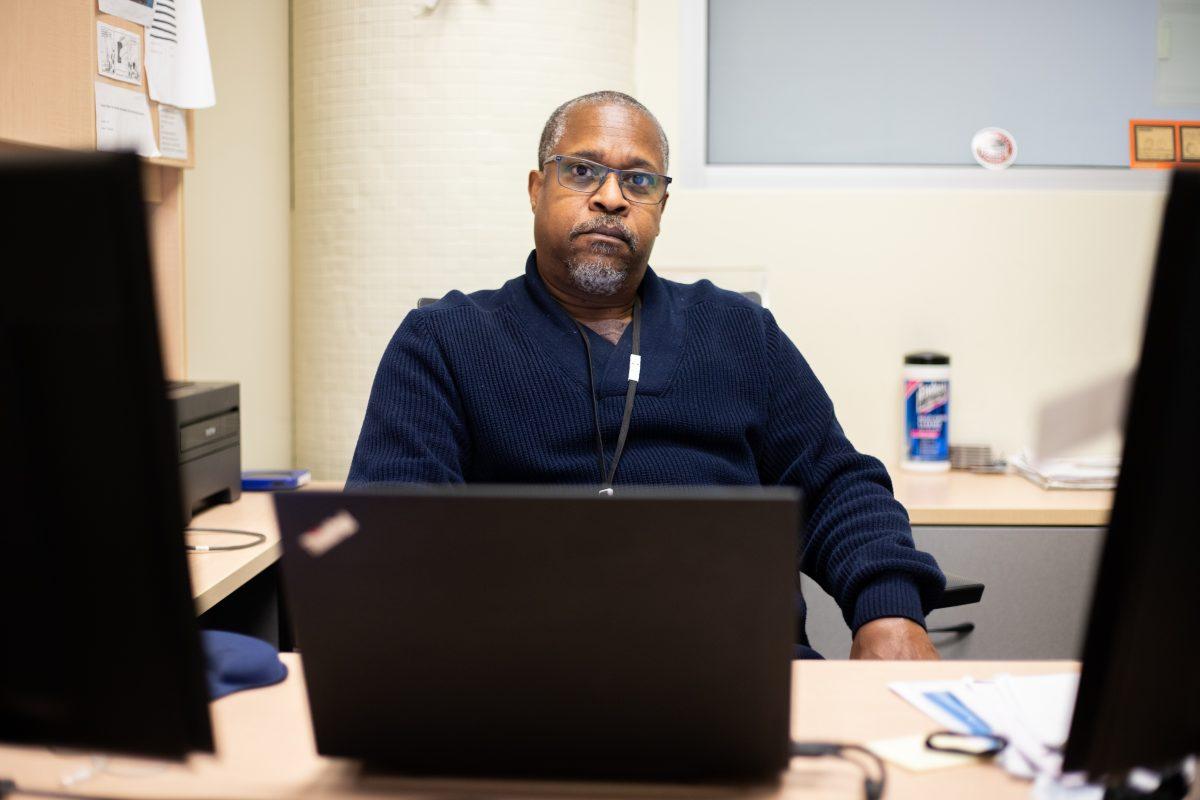Michael Brooks on his writing and his role at St. Joe’s
Michael Brooks, the Drexel Library technology support coordinator, has been working at St. Joe’s for 23 years.
Brooks, a Philadelphia native, interacts with St. Joe’s students on a daily basis in the library to help them with technological problems.
Additionally, Brooks received his undergraduate degree in communications from La Salle University, completed the St. Joe’s writing studies program and is a published author.
How did you become interested in working in library technology?
At one time in my life, I wanted to be a writer, but I didn’t really have the experience. I ended up working in libraries because that’s where I had the bulk of my experience. When I went to La Salle, in my sophomore, junior and senior years, I worked at a reference department there. After I graduated, I only had library experience, so everywhere I applied for had some kind of library background.
It wasn’t until nine to 10 years ago here I got a chance to gravitate toward that writing side. I got my masters degree in writing studies here in 2001. Amongst all of that, I have been working with computers since 1989. My wife bought me a computer back then in 1989, a PC, as a gift. It took off from there. I incorporated technology and computers in with my library work and that’s how I ended up being a technology support coordinator here in the university library.
What are your main responsibilities and roles as the technology support coordinator?
As technology support coordinator, I basically provide front line support for the library. I’m also a liaison between certain aspects of the library and the IT department. I have a very good working repore with the technicians and people who work at the help desk in IT. It’s my job to make sure the printers are working, making sure that the staff side technology is working and running: copiers, printers, computers, laptops desktops, everything and anything having to do with technology.
This semester, I am supervising 13 tech students. I have supervised as many as 15 or 16 in the past. The tech students’ job is to provide support for the front desk staff and any students who need help in the learning commons. The bulk of that is making sure the printers are working.
Why is having a technology support coordinator in a library significant?
I think there is a need for at least one person in every library to be the funnel, to be the go to person for everything and anything that goes on with technology. You are going to have people who are working in the same department who may not know what to do with regards to how a computer operates, how an application operates or how some software works.
The technology person in the library has to understand how a library works. Not everyone in a library is a librarian. You have student workers, part-time people, full-time librarians, it’s a mixture of people. With that mixture of people, you’re going to have a mixture of experiences. Back in cataloging, you have a catalog assistant who is an expert in doing all the cataloging on the computer. But the first time something goes wrong on the computer, they may not know what to do and they need to go to the tech person. The tech person can go figure out what to do before a ticket has to be created and it gets bumped up to IT.
I also consider myself a buffer between the IT staff. I can solve a problem without having to consult IT people. Then they can go about their business dealing with what they need to deal with rather than having to stop and come in and help somebody figure out how to turn the computer on or how to turn it off. If I can do that then I can solve the problem and let IT know it was solved. I make them aware there was a problem in case something else comes up and I can’t solve it.
What type of writing do you publish?
When I was in the graduate studies program here, I originally enrolled to get experience in professional writing so I could do better business correspondence. In the program, I was introduced into something called flash fiction writing, which is storytelling under 1,000 words. I have written three humorous flash fictions stories from the point of view of a father. He could be anybody’s dad. The first book was written 2012, the second was written in 2016 and I just published a third one. It is just a series of conversations between a father and his son.
The father has these sometimes oddball points of view. [He and] his son, they banter back and forth on what the father is talking about. In the one I just published, the grandson is introduced. The grandson pretty much challenges Pop, if you will, with his way of seeing the world. Pop is somewhat like me. [Pop] is an amalgam of my father, my father in-law, me and other men that have been influential in my life. I have just created this character based on all of these other personalities. With the introduction of the grandson, I am trying to look at life from the point of view of a child to simplify the complexities of life.
Anything else that you would like to add?
[I have only been interviewed] one other time in my life. That was back when I was in undergraduate school. I went to La Salle with Michael Brooks, the basketball player. He graduated a year ahead of me. I was taking a journalism class, and I had to go see my journalism professor, and he was in the same building as the head of the sports department. When I went in to see my professor, I had to announce who I was. [The sports director] was in the office and he heard my name. He rushed out, said he wanted to talk to me and that had heard that there was another Michael Brooks at [La Salle] but he didn’t know how to find me.
He set up an interview with me and a sports writer from the Philadelphia Inquirer. They came up to La Salle and took a few pictures of me and Michael on the basketball court. I was interviewed on the phone at my home by this reporter and then the next day I was getting my picture taken. Two days later [the article] was in the Philadelphia Inquirer.
















































